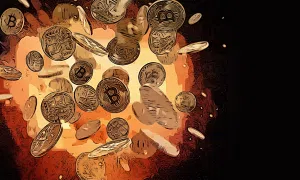Contents
The SEC continues its campaign to regulate the field of cryptocurrencies. The latest move was an attempt to extend the so-called Howey Test to the cryptocurrency market, designed to determine whether or not an asset qualifies as a security. Using the Howey Test, the SEC has already damaged LBRY and XRP’s influence and Binance USD. Why this is important for the cryptocurrency world is discussed below.
What is the Howey Test?
The test is named after the SEC’s 1946 trial with the W. J. Howey Company. In this case, the agency accused the firm of selling tracts along with service contracts, rental rights, and land ownership rights that were treated as unregistered securities.
The reason for this was that Howey continued to care for the land, grow, and sell fruits, while the buyers of the contracts simply received a share of the profits, which went against the Securities Act.
Consequently, the Supreme Court established a definition called the Howey Test. It goes like this:
The brand new newsletter with insights, market analysis and daily opportunities.
Let’s grow together!
“Whether the scheme involves an investment of money in a common enterprise with profits to come solely from the efforts of others”
SEC regulation: what the Howey Test means for the crypto world?
The main thing to understand is that if a financial instrument is a security, it becomes subject to SEC regulation. There are four main types of securities, which are listed in the Securities Act of 1933:
- Debt securities. Money that is borrowed and must be repaid with terms outlining the amount of the loaned funds, interest rate, and maturity date.
- Equity securities. It is an investment in an organization’s equity stock to become a shareholder of the company.
- Derivative securities. Stocks, bonds, currencies, interest rates, market indices, and goods.
- Hybrid securities. Combines the characteristics of both debt and equity securities.
As we can see from the third point, the term “security” also includes currencies. So the question arises: do cryptocurrencies fall under it? This is where the Howey Test comes into play, which, in order to pass, requires that an asset be analyzed according to four criteria. If a transaction is:
- An investment of money.
- In a common enterprise.
- A reasonable expectation of profit.
- Derived from the efforts of others.
However, according to analyst Adam Cochran, securities are a much broader category than the concepts defined by the Securities Act.
“Honestly, if the SEC wants to, with how vague the act is, it’s fairly easy to put anything under it,” he says.
He also added that those who do not make money from their assets could fall into this category. According to him, one does not have to be a profitable security to be a security.
“If someone is holding or otherwise securing value for you, and you are trusting them to do it, and not otherwise exempted, its a security,” Adam Cochran states.
So, contrary to definitions, the SEC has called Binance USD securities. There is no straightforward answer to this question, if only because stablecoin is a relatively new phenomenon. However, BUSD holders rather seek rather stability in their transactions with the cryptocurrency than expect to earn income; that’s why, based on the Howey Test, the asset is not considered to be a security. That’s why users of the network found the SEC’s accusation absurd.
However, the SEC still has the last word. And, given the flexible interpretation of the law, in theory, the agency can adjust the definition to suit its needs.
How to pass Howey Test compliance checks. Recommendations for crypto projects
Cryptocurrencies that do not fall under the Howey Test are immediately defined as service tokens. It is a kind of right to a service or product, not an investment. Rather, it is simply a coin that is used as a coupon for product development. This includes Filecoin.
If an asset passes the Howey Test, it is automatically recognized as a security and falls under SEC regulation. Finding out in advance if your project is a security or not is very important. Because if the agencies find out later, you will face serious legal problems. So, according to the test:
- At the initial stage, there should be no large investments in the project, especially without revealing their source. If the project is decentralized enough, the native token will not be regarded as a security. That is, funds raised from community members are not considered securities.
- The project should not offer its assets to investors, promising profits in the future. For example, in the Ethereum ecosystem, tokens are designed more to manage the economics of operations on the network.
- If profits are made through the efforts of others, the criterion is met. It’s just like the W. J. Howey Company’s case.
- The business must not be speculative. That is, the project must have some value.
So, chances are, it’s better to avoid all future complications in advance.
Which cryptocurrencies have already been analyzed by the Howey Test?
One of the most famous cases is the SEC’s lawsuit against Ripple. The case dates back to 2020, when the agency accused the company of raising $1B by selling its own native XRP token to investors. In light of this, the SEC defined the coin as a security.
However, XRP has many supporters. One of them is popular lawyer and founder of CryptoLaw, John E Deaton. And, according to him, the same is true for Bitcoin.
If @Ripple offered or sold #XRP as an investment contract at some point during its history – or even if it does today – it does not make #XRP a security. #XRP remains digital code.
The Judge in @LBRYcom ruled LBRY sold #LBC as an investment contract when it made DIRECT sales.
— John E Deaton (@JohnEDeaton1) February 3, 2023
The agency’s action caused a firestorm of reaction in the cryptocurrency industry because similar projects had previously operated without much oversight. The XRP case is still ongoing. A decision is rumored to be due in 2023.
One recent case involves LBRY Credits (LBC), which the SEC also identified as a security because of a secondary market sale. However, on January 30, 2023, during an appeal hearing, the SEC publicly stated that secondary market sales are not considered securities. This case breathed hope into XRP holders. Read more about it here.
According to Luganodes analysts, a token like Ethereum is also not a security. Because stacking and decentralizing the ecosystem because of different validators does not satisfy the conditions of the Howey Test.
7/
Beyond the legal analysis, applying securities laws to staking would result in an ill-fitted and absurd application of the law. Staking does not involve an identifiable issuer or promoter, so imposing disclosure obligations on validators would be unreasonable.— Luganodes (@luganodes) March 1, 2023
But as for SWEAT token, a mobile app for earning coins for walking in real life, some people think that it is security. The Twitter account of the SWEAT Economist conducted a poll. Thus, 61.5% believe that SWEAT is security.
Here’s what users can do with the app:
- Exchange SWAT for fiat and stablecoins.
- Buy NFTs on the SWEAT network by investing in other digital assets.
- Leave SWEAT in liquidity pools and receive a steady income from the coin.
Is $SWEAT a security?
According to the Howey Test, a transaction or an asset is a security, if it satisfies the following:
“investment of money in a common enterprise with a reasonable expectation of profits to be derived from the efforts of others.” So, is SWEAT a security?— SWEAT Economist (@SweatEconomist) March 1, 2023
Nevertheless, the token has not yet come to the attention of the SEC. But maybe that’s just for now.
It would also be reasonable to guess, are NFTs a security? According to Secret Project founder natealex, it all depends on how users view NFTs. That is, if no one has “reasonable expectations” to make money from selling pictures, they are not securities.
re: are NFTs securities?
Per the Howey test:
“there is the investment of money in a common enterprise with a reasonable expectation of profits”Logic suggests that no one should ever have a “reasonable expectation” of making $$ by selling JPGs, therefore NFTs are not securities
— natealex ᛩϾ⥿Ͽ⧽ (@natealexnft) February 24, 2023
How far do you think the SEC will go with regulating digital assets? And do you think cryptocurrencies are a security, and why? We are waiting for your answers in the comments.






